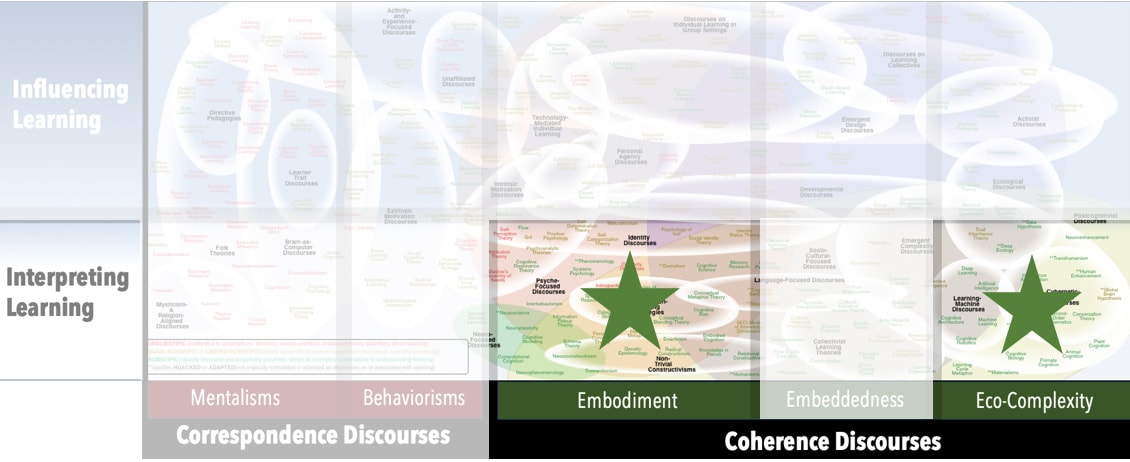Focus
Learning as a biological functionPrincipal Metaphors
- Knowledge is … scope of systemic possibility
- Knowing is … living; adequate biological functioning
- Learner is … any living system
- Learning is … adapting; elaborating (current scope of functioning)
- Teaching is … N/A
Originated
1970sSynopsis
Within Cognitive Biology, learning and thought are regarded as biological functions. Concisely, a living system’s cognition comprises every act of sensing environmental cues and responding accordingly. In other words, bacteria, plants, animals, and all other living organisms are continuously cognizing. Thus, learning and cognition are not higher-order mental phenomena; rather, they exist on a continuum of physical-chemical-electrical processes. That is, learning is an adaptive dynamic, often coordinated with other agents, that hopefully contributes maintaining the organism’s viability.Commentary
As might be anticipated, most commentary on and criticism of Cognitive Biology have two intertwining foci: (1) entrenched conceptual boundaries between human and non-human, and (2) entrenched brain-based conceptions of learning and cognition. Regarding the former, many find themselves unable to replace deep-set assumptions rooted in Newtonian dynamics (see Correspondence Discourses) with alternatives based on Darwinian dynamics (see Coherence Discourses). Regarding the latter, some cannot imagine learning without a receptacle (e.g., mind, brain, nervous system) to contain the learnings – that is, criticisms tend to invoke indefensible Folk Theories. Phrased somewhat different, Cognitive Biology might be characterized as a rejection of Anthropocentrism ...- Anthropocentrism (Human Exceptionalism; Human Supremacy; Humanocentrism) – beliefs and actions rooted in the conviction that humanity occupies a distinct and superior place on the planet. That is, all other entities are seen as lesser to humanity and available for exploitation. Associated constructs include:
- Humaniqueness (Mark Hauser, 2000s) – those mental attributes and cognitive abilities that distinguish humanity from other species, such as abstract thought, logical calculus, symbol use, and combining ideas
- Post-Anthropocentrism (late-1900s) – a philosophical and ethical framework that challenges the idea of human superiority and centrality in the world. Post-Anthropocentrism emphasizes the interconnectedness of all living beings and non-living entities, advocating for a more inclusive, non-human-centric perspective on knowledge, ethics, and environmental responsibility.
- Biocentrism – meaning “life-centered,” the perspective that regards humanity as an integral part of the biosphere, but that does not assume or project notions of hierarchical ordering of or inherent privilege among varied lifeforms. Related discourses include:
- Biospherical Egalitarianism (Arne Naess, 1970s) – the conviction that all life forms have inherent value and that any attempt to compare or rank living entities is ethically inappropriate
- Ecocentrism – a discourse that is most often defined as an opposite to Anthropocentrism, structured around a nature-centered (vs. human-centered) perspective on the biosphere
- Radical Environmentalism (Christopher Manes, 1990s) – a perspective on environmental activism founded on the conviction that a critical part of any effective response must be the rejection of many modern, western sensibilities (i.e., those that underpin and infuse capitalism, patriarchy, and other hegemonic constructs)
- Speciesism (Richard Ryder, 1970s) – akin in meaning to “racism,” “classism,” “sexism,” and similar constructs, any manner of discrimination, exploitation, or otherwise unjust differential treatment of an animal based on its species. Subdiscourses include:
- Anti-Speciesist Pedagogy (Helen Kopnina, Brett Cherniak, 2010s) – “Anti-speciesism” is an abolitionist stance against exploitation of mammals, fish, birds, reptiles, and amphibians – and, so, Anti-Speciesism Pedagogy involves education on the use of animals and animal products for food, clothing, decoration, medical experimentation, and so on.
- Sentiocentrism (Sentientism) – a type of Speciesism that focuses on sentience, asserting that all sentient entities have the same ethical status and share similar rights
- Neohumanism (Prabhat Ranjan Sarkar, 1980s) – a movement oriented by a recognition of ecological connectedness and defined by an imperative to respect and preserve all aspects of the universe, animate and inanimate. (Note: the “humanism” part of Neohumanism has little to do with Humanisms and their related discourses, except for their rejection of any system of belief that relies on spirits, deities, or other mystical forces.)
Authors and/or Prominent Influences
Brian C. Goodwin; Ladislav KováčStatus as a Theory of Learning
Cognitive Biology is a theory of learning – and one that is proving a useful device for compelling commentators to reveal their deep-seated (usually dualism-based) assumptions and beliefs about learning.Status as a Theory of Teaching
Cognitive Biology is not a theory of teaching, although it does compel a rethinking of the still-dominant models of and assumptions about teaching that are rooted in Correspondence Discourses.Status as a Scientific Theory
Cognitive Biology is a scientific theory – in part because proponents (unlike many detractors) are explicit about assumptions, metaphors, and definitions surrounding learning and cognition. As well, Cognitive Biology has a substantial and rapidly growing evidence base.Subdiscourses:
- Anthropocentrism (Human Exceptionalism; Human Supremacy; Humanocentrism)
- Anti-Speciesist Pedagogy
- Biocentrism
- Biospherical Egalitarianism
- Ecocentrism
- Humaniqueness
- Neohumanism
- Post-Anthropocentrism
- Radical Environmentalism
- Sentiocentrism (Sentientism)
- Speciesism
Map Location

Please cite this article as:
Davis, B., & Francis, K. (2025). “Cognitive Biology” in Discourses on Learning in Education. https://learningdiscourses.com.
⇦ Back to Map
⇦ Back to List
